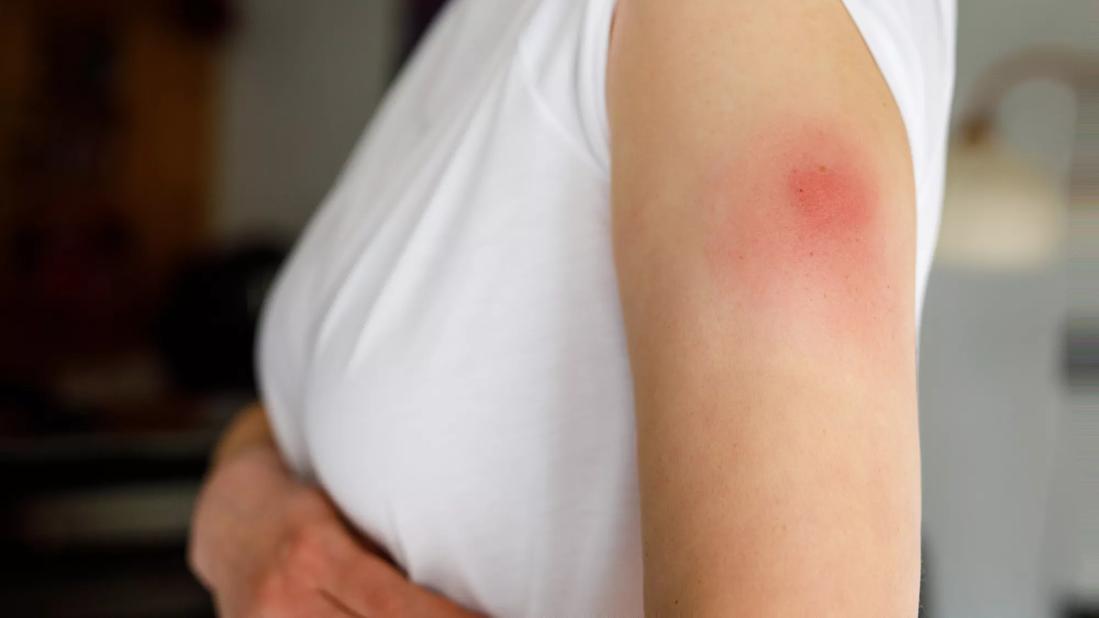Advertisement
Redness, swelling, itching and rash can happen when your body’s immune system reacts to the vaccine injection

When you think of reactions you can expect from the COVID-19 vaccine, the usual suspects are flu-like symptoms, such as chills, tiredness and a bit of muscle soreness. But what if shortly after your vaccine, you’re still feeling pain in your arm and notice a big, itchy, red blotch near the injection site?
Advertisement
Cleveland Clinic is a non-profit academic medical center. Advertising on our site helps support our mission. We do not endorse non-Cleveland Clinic products or services. Policy
It’s been dubbed “COVID arm,” a rare symptom that some people have reported after being vaccinated for COVID-19. If you’re experiencing this, you’re likely wondering if it will clear up on its own or if it’s something you should be concerned about. And how do you know if something more serious is going on?
Inflammation and immunity specialist Thaddeus Stappenbeck, MD, PhD, explains what COVID arm is, why it happens and how to find relief.
“COVID arm” is a nickname for a side effect that some people experience after getting the COVID-19 vaccine, especially the Moderna or Pfizer-BioNTech vaccines. It usually happens a few days after the shot, can be a bit uncomfortable and can last up to a week.
You may notice your skin becoming red or warm at the injection site. Mostly, COVID arm is just a sign of your immune system jumping into overdrive to form an immune response against the vaccine.
Symptoms of COVID arm include:
This doesn’t just happen with COVID-19 vaccines either, points out Dr. Stappenbeck. If you’ve ever had a tuberculosis test where you receive the injection under your skin and then get checked a day later to see if there’s any puffiness, what they’re testing for is something called a “delayed-type hypersensitivity reaction.”
Side effects of COVID arm typically occur about seven days after the first shot and about two days after the second dose. “It usually takes a few days to develop,” confirms Dr. Stappenbeck.
This unusual symptom happens because of the way our immune system works. When you get the COVID-19 vaccine, it contains a tiny piece of the virus that instructs your body how to recognize and respond to the virus. This helps your immune system learn how to fight the virus if you ever come in contact with it.
Advertisement
“What we essentially think is going on with COVID arm is that your immune cells are reacting to muscle cells that have taken up the messenger RNA vaccine,” explains Dr. Stappenbeck. “The immune cells can be a little over-exuberant because they view the SARS-CoV2 spike protein produced by the vaccine as an infection that they need to fight off.”
In some people, their immune system responds strongly to the vaccine. It sends lots of immune cells to the area where you got the shot, causing side effects in the arm and throughout the rest of your body.
“That’s the puzzling thing when it comes to COVID-19. You’d think that this virus would just cause a cold and that’s it. But when it gets deep into your lungs, then it’s a race against the clock. The part of your immune system that’s making the antibodies will ramp things up to clear the virus,” he continues.
With the vaccine, Dr. Stappenbeck adds that your innate immune system is trying to destroy that piece of virus from the immunization. “So, that’s the battle. And this is why the COVID-19 vaccines are so valuable. Because if you do get this infection and you’re vaccinated, you can start making antibodies right away.”
You can expect symptoms of COVID arm to last for a few days to a week. It’s a temporary side effect of the COVID-19 vaccine and usually goes away without needing any specific treatment. In most cases, people notice improvement within a few days, and the redness, swelling or rash on the arm gradually fades.
“COVID arm usually goes away within a few days and is not life-threatening,” Dr. Stappenbeck reiterates.
If you notice your symptoms lasting longer than a week or if they worsen, you should contact a healthcare provider for guidance and to rule out any other potential issues.
If you’re experiencing COVID arm, here are some ways to ease the discomfort:
Advertisement
It’s also good to plan before your next COVID-19 vaccine. “If you’re worried about possibly having a sore arm after your next immunization, get it in the opposite arm to make things a little easier,” advises Dr. Stappenbeck.
If you’re experiencing COVID arm after receiving the vaccine, know that it’s most likely a sign that your body is forming an immune response and building protection against the virus. Your symptoms should subside within a week. But if they continue or worsen, be sure to speak with a healthcare provider.
Advertisement
Learn more about our editorial process.
Advertisement

Most routine vaccines are safe for people living with multiple sclerosis — but be sure to talk with your care team about your needs

The medication is ineffective and — in the case of animal ivermectin — potentially dangerous

Updated vaccinations are recommended to better protect against the evolving virus

Enteroviruses are often to blame for summer colds, leading to a runny nose, sore throat and digestive symptoms

Studies suggest 1 in 5 people infected with the coronavirus never develop symptoms

An increased risk of blood clots can last for nearly a year after a COVID-19 diagnosis

The answer varies from person to person and vaccine to vaccine

COVID-19 may be associated with tinnitus, but research is still ongoing

Focus on your body’s metabolic set point by eating healthy foods, making exercise a part of your routine and reducing stress

PFAS chemicals may make life easier — but they aren’t always so easy on the human body

While there’s little risk in trying this hair care treatment, there isn’t much science to back up the claims